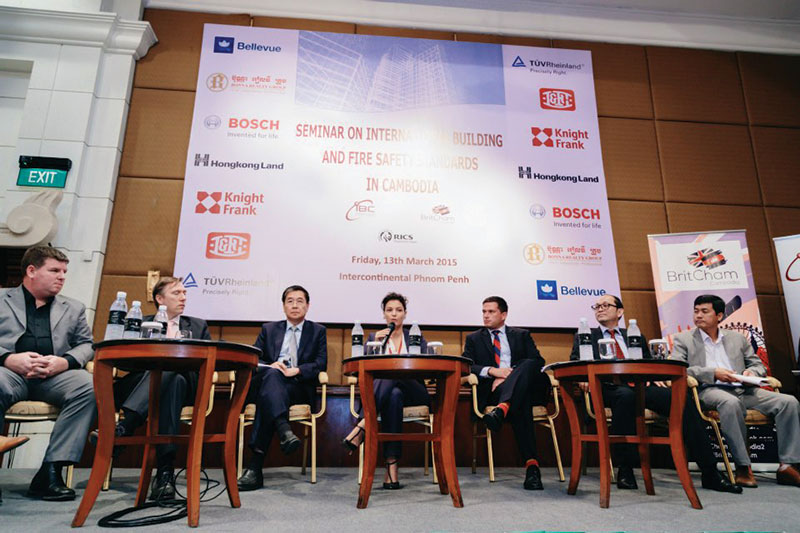Seminar Highlights Urgency of Building Code
BritCham and IBC held a joint seminar on Building and Fire Safety Standards with the UK Royal Institution of Chartered Surveyors (RICS) on 13 March at the Hotel Intercontinental which attracted approximately 300 people.
RICs was commissioned to produce a report on the topic with a view to providing the Cambodian Government with assistance in developing building standards and ensuring better regulation.
Will Myles, Regional Managing Director Asia Pacific for RICS presented the report conducted in 2014 and provided a recap of its key findings and recommendations.
The RICS Report outlines a number of key recommendations on what the Cambodian Government can do to improve building standards. The recommendations are very concrete and RICS have further provided proposals to assist the Government in achieving these goals. Some of these are already underway – for example, the drafting of a legislative framework for the construction sector.
“The purpose of building standards is to act in the public interest. The best way to provide confidence, attract investment and ensure public safety is to adopt international standards. However, this cannot be done through one institution alone,” explained Myles in his address. “When people invest here, they use their own standards; they may be appropriate, they may not, but no-one is checking. An entire risk-based program will costs tens of millions of dollars and time to achieve so there is a need to prioritise,” he added.
Ultimately however, the key to improving Cambodia’s building standards is through active participation and engagement of relevant stakeholders, both from the private and public sector, towards improving the current situation. The business community has a critical role and a shared responsibility in this area. Setting up a Task Force where the private sector can dialogue unanimously with Government and take action is one way of doing this.
“The issue is not one of regulation per se”, Myles pointed out, “but one of behavior change.”
Mr. Bill Jones, RICS Managing Director ASEAN then provided examples of case studies where building collapses in France and Israel had resulted in investigations which reached across the entire public building sector and led to the strengthening of the regulatory framework for construction standards.
“To achieve the long term evolving plans required, there is a need for ‘champions’ for reform”, said Jones, “a strong group within which there are one or two very dedicated individuals.”
Daniel Parkes, General Manager, HongKong Land and Chairman of the IBC Real Estate Subcommittee who was moderating the seminar summed up the need for action on the Cambodian building code.“There is a sense of urgency in Cambodia,” he said. “What can be done in 6 months, 12 months? What are the priorities? It is clear that we have to work with existing capabilities and develop them over time, with a good example being the need for structural surveys.”
The seminar also featured a panel discussion, moderated by Daniel Parkes and including; H.E. Pen Sophal, Secretary of State of the Ministry of Land Management, Urban Planning and Construction; Mr. Van Sou Ieng, President GMAC; Mr. Will Myles, RICS Regional Managing Director Asia Pacific; Mr. Bill Jones, RICS Managing Director ASEAN, Ms. Sarah Hopkins, Sustainability Project Leader H&M; Mr. Andre De Jong, Managing Director of Robert Bosch Cambodia; Mr. Paul Hurford, Managing Director, Azisafe; and Alexandra Herbel, General Manager TUV Rheinland Cambodia.
The key theme which emerged from the expert’s discussion was the need for investors to have confidence in standards and regulatory system. Will Myles pointed out that, “without enforcement, investors lose confidence but there needs to be gradual increments of enforcement for standards to be achievable.” H.E. Pen Sophal agreed saying that, “everyone – the government, the market, investors, and buyers – wants quality. The issue is one of economic factors.”
Alexandra Herbel from TUV argued that the regulatory authority must start doing inspections on new buildings going up now to ensure they can act if there are problems. “Applying standards is about mitigating risk,” she said.
Most panel members also agreed that construction site safety was a massive issue that was being effectively ignored by the government.
On the need for building and fire safety in factories, Van Sou Ieng questioned which needed to come first regulation or investment in safety systems? “All international investors want to see documentation to prove quality and standards of buildings. It is urgent for the government to put in place a system to confidence to investors. At the moment, there are too many institutions doing inspections.”
Paul Hurford stressed that fire safety is a far greater concern currently than structural safety, especially given the increase in high rise buildings. “The concern is that there is the need for an easy solution so there are multiple systems and authorities. The biggest risk is that all stakeholders are not working together,” he said. As well as systems responses, Paul also pointed out that behavior change is the most pressing priority.
Broad agreement was reached over a number of issues by the panel, the key ones being that; the private sector wants and needs regulation to give confidence to investors, the private sector is prepared to play an active role in developing inspections, regulations, education, systems, processes, ethics, and standards; on-site safety and fire safety are pressing priorities for the industry, indemnity insurance is required for the industry; and that long-term the Cambodian building code will take precedence but in the short term a mix of international standards seems likely.
Following the panel discussion, RICS gave a special presentation for Bonna Realty founder Mr. Sung Bonna for his services to real estate.
Britcham and IBC intend to invite RICS to return in the near future to continue to provide information on these critical issues for the Cambodian construction and property industries.
- Video Advertisement -



 ខ្មែរ
ខ្មែរ







